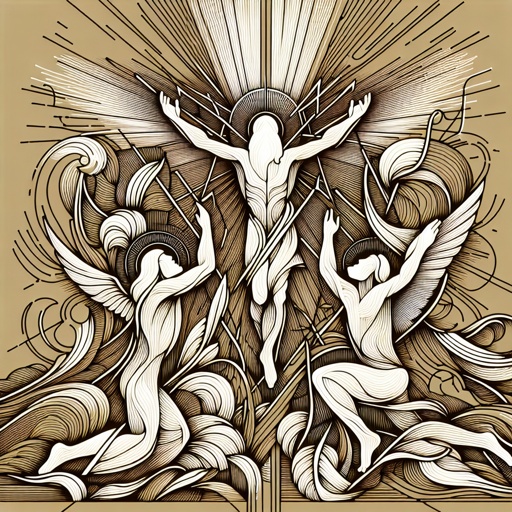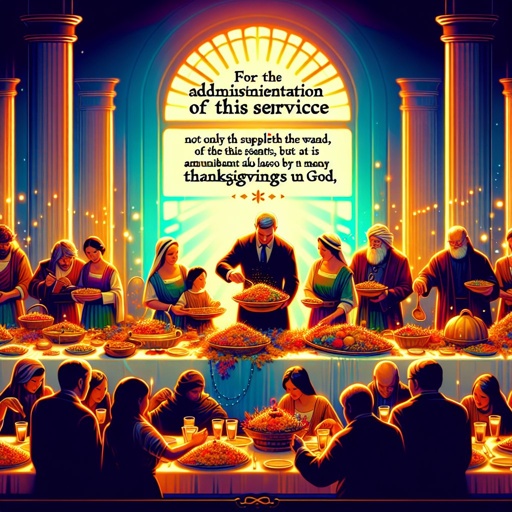What does 2 Corinthians 12:9 mean?
"And he said unto me, My grace is sufficient for thee: for my strength is made perfect in weakness. Most gladly therefore will I rather glory in my infirmities, that the power of Christ may rest upon me." - 2 Corinthians 12:9

2 Corinthians 12:9
2 Corinthians 12:9 (KJV) states, "And he said unto me, My grace is sufficient for thee: for my strength is made perfect in weakness. Most gladly therefore will I rather glory in my infirmities, that the power of Christ may rest upon me."
This verse from the Bible holds profound meaning and significance for believers. It is part of a larger passage in which the apostle Paul, the author of 2 Corinthians, talks about his "thorn in the flesh" and the struggle he faced in dealing with it. The thorn in the flesh is believed to have been a physical affliction or weakness that Paul endured, though the exact nature of it is not specified in the scripture.
At the beginning of 2 Corinthians 12, Paul describes an extraordinary experience in which he was caught up to the third heaven and heard inexpressible things, things that no one is permitted to tell. But he goes on to say that to keep him from becoming conceited because of these surpassingly great revelations, a thorn was given to him in the flesh, a messenger of Satan, to torment him. Three times he pleaded with the Lord to take it away from him. However, the Lord's response to Paul's plea is the pivotal verse 9.
The verse begins with "And he said unto me", signifying that this is a direct message from God to Paul. The first part of the verse, "My grace is sufficient for thee", speaks to the all-encompassing and unmerited favor of God. God's grace is abundant and boundless, and it is precisely what sustains and supports believers during times of weakness and hardship. Regardless of the trials and difficulties they face, believers are reassured that God's grace is enough to see them through, as it is perfect in its ability to provide for their needs.
The next part of the verse, "for my strength is made perfect in weakness", further emphasizes the theme of God's strength being manifested in the midst of human frailty. This concept is counterintuitive to human reasoning, as weakness is often equated with inability and powerlessness. However, God's strength is magnified and perfected in the weakness of His followers. This serves as a powerful reminder that it is through acknowledging one's limitations and relying on God's strength that true spiritual power is realized.
The verse continues with "Most gladly therefore will I rather glory in my infirmities, that the power of Christ may rest upon me." Paul's response to God's assurance of sufficient grace and perfected strength in weakness is one of enthusiastic acceptance. He expresses a willingness to boast, not in his strengths or accomplishments, but in his weaknesses and infirmities. This is a radical departure from the values of the world, which often prioritize self-sufficiency and the showcasing of one's abilities. Instead, Paul embraces and exalts his weaknesses because it allows the power of Christ to be prominently displayed in his life.
The theme of embracing weakness and finding strength in God is a recurring motif in the New Testament. Jesus himself taught that "Blessed are the meek, for they will inherit the earth" (Matthew 5:5, KJV), and the apostle Paul wrote that "When I am weak, then I am strong" (2 Corinthians 12:10, KJV). This theme serves to shift the focus from human achievement and self-reliance to a complete dependence on God, recognizing that His power is made perfect in human weakness.
The context of 2 Corinthians 12:9 also provides insight into Paul's personal struggles and challenges. As a prominent figure in the early Christian church, Paul faced numerous trials and hardships, including persecution, imprisonment, and physical ailments. This verse offers a glimpse into Paul's inner turmoil and his dependence on God's grace to sustain him through the difficulties he encountered in his ministry. It is a poignant reminder that even the most dedicated and faithful servants of God are not exempt from suffering, and yet, in their weaknesses, God's strength is made manifest.
Additionally, the symbolism in this verse is powerful. The "thorn in the flesh" that Paul refers to is symbolic of any form of affliction or weakness that believers may experience. It serves as a reminder that everyone grapples with their own struggles and limitations, and it is in these very weaknesses that God's grace and strength are most evident. The imagery of a thorn conveys the idea of something small yet persistent, causing discomfort and anguish. In this way, it represents the trials and tribulations that individuals face, which can often feel like a constant source of pain.
In conclusion, 2 Corinthians 12:9 is a verse that offers comfort, encouragement, and perspective to believers facing adversity. It underscores the reality of human weakness and the sufficiency of God's grace to sustain and uphold His followers. It challenges the conventional wisdom of finding strength in self-sufficiency and instead points to the paradox of finding true strength in surrendering to God's power in the midst of weakness. This verse continues to be a source of hope and inspiration for Christians, serving as a reminder that in their most vulnerable moments, they can find unwavering strength in the grace of God.
2 Corinthians 12:9 Artwork

2 Corinthians 12:9

2 Corinthians 12:9

2 Corinthians 12:9

2 Corinthians 12:9-10

2 Corinthians 12:9 - "And he said unto me, My grace is sufficient for thee: for my strength is made perfect in weakness. Most gladly therefore will I rather glory in my infirmities, that the power of Christ may rest upon me."

2 Corinthians 12:9-10 - "But he said to me, 'My grace is sufficient for you, for my power is made perfect in weakness.' Therefore I will boast all the more gladly about my weaknesses, so that Christ’s power may rest on me. That is why, for Christ’s sake, I delight in weaknesses, in insults, in hardships, in persecutions, in difficulties. For when I am weak, then I am strong."

2 Corinthians 9:9

2 Corinthians 12:7

2 Corinthians 12:7

2 Corinthians 12:7

2 Corinthians 12:7

1 corinthians 2:12

1 corinthians 2:12

1 corinthians 2:12

1 corinthians 2:12

2 Corinthians 9:12 - "For the administration of this service not only supplieth the want of the saints, but is abundant also by many thanksgivings unto God;"

2 Corinthians 12:2-4 – Paul’s vision of the third heaven.

1 Corinthians 12:9 - "To another faith by the same Spirit; to another the gifts of healing by the same Spirit;"

2 Corinthians 13:12 - "Greet one another with an holy kiss."

2 Corinthians 4:9 - "Persecuted, but not forsaken; cast down, but not destroyed;"

2 Corinthians 9:15 - "Thanks be unto God for his unspeakable gift."

1 Corinthians 12:12

2 Corinthians 4:12 - "So then death worketh in us, but life in you."

2 Corinthians 9:1 - "For as touching the ministering to the saints, it is superfluous for me to write to you:"

2 Corinthians 12:12 - "Truly the signs of an apostle were wrought among you in all patience, in signs, and wonders, and mighty deeds."

1 Corinthians 12:12-22

2 Corinthians 6:12 - "Ye are not straitened in us, but ye are straitened in your own bowels."

2 Corinthians 9:9 - "(As it is written, He hath dispersed abroad; he hath given to the poor: his righteousness remaineth for ever."

2 Corinthians 9:10-12 - "Now he who supplies seed to the sower and bread for food will also supply and increase your store of seed and will enlarge the harvest of your righteousness. You will be enriched in every way so that you can be generous on every occasion, and through us your generosity will result in thanksgiving to God. This service that you perform is not only supplying the needs of the Lord’s people but is also overflowing in many expressions of thanks to God."

2 Corinthians 10:9 - "That I may not seem as if I would terrify you by letters."